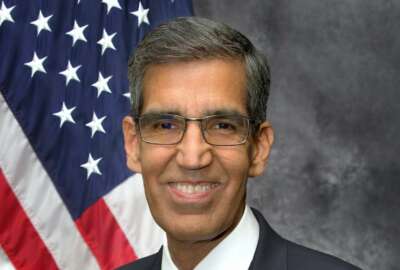
Creating a viable resource for coronavirus information
The Library of Congress has published a resource guide that brings together many coronavirus data sources that are otherwise scattered all over.
Best listening experience is on Chrome, Firefox or Safari. Subscribe to Federal Drive’s daily audio interviews on Apple Podcasts or PodcastOne.
One thing the government is producing a lot of with respect to coronavirus: Information. Now the Library of Congress has published a resource guide that brings together many data sources that are otherwise scattered all over. Here with what’s in their senior legal reference librarian in the public services division at the library, Margaret Wood joined Federal Drive with Tom Temin.
Interview transcript
Tom Temin: Ms. Wood, good to have you on.
Margaret Wood: Good morning, Tom, nice to be on.
Tom Temin: Tell us about this reference that you’ve put together, this packet of information, because the government has, well, I don’t think you can put your arms around all of the information the government is putting out.
Margaret Wood: Well, this is created as one of our blogs on the law library and part of the blog’s charter for the law library is that we should write about current and breaking events. So you know, obviously this started as putting up information about the new legislation and various presidential orders and from there, we just decided to add additional information. People may or may not know we have a team of foreign legal specialists who work for the law library. And they’ve done a number of articles on developments in other countries. So we were able to fold these into the resource guide as well, you know, information about what’s going on elsewhere in the world. So, you know, we’ve created it [to] hold together various information. As where the law library, of course, the focus is on legislative information, laws, regulations, directives, that type of material.
Tom Temin: And what form does it take? Do people see a long list of links to information? Is there explanation around it?
Margaret Wood: Well, yeah it’s a blog. It’s kind of turning into a long list. I published it initially on March 20. And we’ve been updating it every week. And it is getting to be more of a long list than I necessarily like in terms of format. And we may, in fact, look into folding it so that we have headers and then people can open that up. Because it is, yeah, it’s turning into one of those long scrolling lists. So we’re going to probably work as we continue to update it on making it a little more interactive, so it’s easier for people to look for material if they want.
Tom Temin: Can people search by topic?
Margaret Wood: Um, well sure I mean, a lot of it are links at this point. So is it the a guide, you know, we’re just linking them over to material? And I think searching within it, they could, but it’s more like you’d just be searching on a web page. So it’s a guide with links, as opposed to, you know, kind of an analysis of itself, although the links are in many cases, you know, with the articles from the foreign legal specialists, and we are also highlighting certain CRS reports, you know, then we’ll have more in depth information about the topic.
Tom Temin: And I understand that most everyone at the Library of Congress is teleworking, but it sounds like this is the type of project where teleworking really wouldn’t make that much difference in your ability to keep it all updated and blog that.
Margaret Wood: No, well, I mean, the blog is we actually we run the blog on email, even when we’re not teleworking. So it’s a cooperative effort. There’s a team, if you were to go to the law libraries blog page, you’ll see all the different authors. And so all the posts are actually circulated to the team. People provide information. So it’s actually, it’s one of those things where it doesn’t matter if we’re teleworking or in the office. The blog itself is kind of all run through email. The publishing software is WordPress, but in terms of kind of collaborating on the posts, we do it through email.
Tom Temin: Yeah, WordPress is slow, but it’s been pretty steady throughout all of this as far as I can tell.
Margaret Wood: Ya know, it seems to be working and it’s doing fine. So yeah, it is the software that the library has for the blogs. And the law libraries blog, I believe is going to be 10 years old this August. So we’ve been doing it for a while.
Tom Temin: Yeah, we’re speaking with Margaret Wood. She’s senior legal reference librarian in the public services division at the Library of Congress. And do you track who, not so much by name or who they are personally but, where the visitors are coming from? Is it mostly law firms? Is it mostly Congress, or maybe the general public?
Margaret Wood: I don’t have that breakdown. That’s kind of a different group. I do know that we’ve had over 10,000 page views of the guide to date. I’ll be frank, I put it together really, for two groups of people. I put it together for our public patrons. And I also put it together for you know, my law library colleagues and myself. We get questions into the digital reference service Ask a Librarian, and we started seeing questions, you know, about the legislation Congress was passing, about presidential orders, and proclamations you know, where was this information so forth and so on. So the guide was put together both for us to be able to point the public to someplace where a lot of this was being pulled together so that our, you know, myself and my fellow librarians weren’t doing the same work again and again and again. And of course, then it’s also there for people to be able to go to it themselves and look up and find information that they want. You know, sometimes finding laws and regulations online, searching for that information can be overwhelming. The legal terminology can kind of be confusing, and you’re – is this the right page I want or not? I really put it together for the public and also for myself and my colleagues to be able to point people asking questions to someplace that had links to different bits of information.
Tom Temin: Yes, because a lot of the academic institutions, the law schools and so forth, do have reference libraries online about, say, the code of the United States and different laws like that. If you want to look up something about say Title V. And it is hard to know –
Margaret Wood: Cornell University.
Tom Temin: Yeah, I’m there all the time. They should give me a degree I spend so much time in their law library. But I imagine looking at what people are themselves looking at could give you a clue as to what might be something to highlight somewhere.
Margaret Wood: Um, well, I mean, what we see in terms of what we count our specific pageviews, and that’s, you know, for our content. And I – you know, certainly one of the issues though is you know, the privacy information for people who are looking. So you know, I’m not going to be able to see that. We do with the Congress.surveys people self identify. So we have some sense of you know, what kind of research they’re doing. That’s also, you know, an option in the Ask a Librarian. People can tell us why they’re doing types of research, but that’s always optional. But you know, we kind of count more broadly, in terms of what people are looking at.
Tom Temin: And with this particular reference section that you’re building, do you see an end to it? Because it’s hard to know when the pandemic will end, and when the assessment of it end. So it may be that this is something that could go on a while.
Margaret Wood: Yeah, well, I mean, we’re continuing to update the blog weekly, which is not our usual practice. Usually we publish and we publish, and it’s there for people to go back to. You know, sometimes we write a new blog about a topic if something new has happened. In this case, because it’s ongoing because we’re expecting more legislation from Congress. We’re expecting more directives from the president, more information from various government agencies, we’re going to go ahead and update this weekly for the foreseeable future. Obviously, at some point when the pandemic ends, you know, we may shift. There may be new legislation with a somewhat different focus, we may do another guide, you know, with different types of information. But it’s kind of as things develop. And yeah, I mean, this one may become – the document itself maybe becomes somewhat unwieldy, and we may do a follow up. But the reason to go ahead and keep with this particular one is that all the information is in one place, and we don’t have to direct people to say like three blogs – oh, if you want this information, go here. If you want that information, go there. If you want, that information goes somewhere else. You know, that then gets to be kind of more than people need. It’s easier to say if you’re looking for the law, if you’re looking for the presidential proclamation, the links are here. Here’s the list and you can go to those.
Tom Temin: Margaret Wood is senior legal reference librarian in the public services division at the Library of Congress, thanks so much for joining me.
Margaret Wood: All right, have a good day.
Tom Temin: We’ll post this interview along with a link to the guide at www.FederalNewsNetwork .com/FederalDrive. Hear the Federal Drive on your schedule. Subscribe at Apple Podcasts or Podcastone.
Copyright © 2024 Federal News Network. All rights reserved. This website is not intended for users located within the European Economic Area.
Tom Temin is host of the Federal Drive and has been providing insight on federal technology and management issues for more than 30 years.
Follow @tteminWFED





